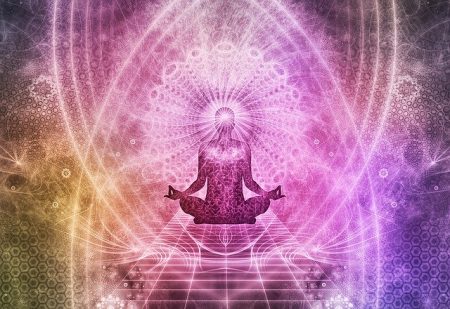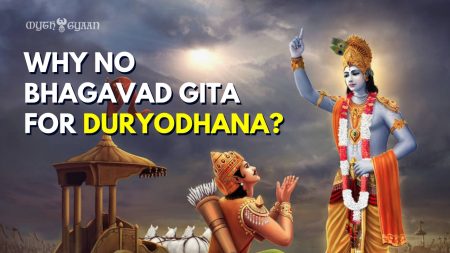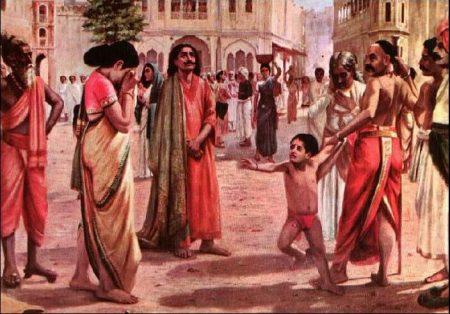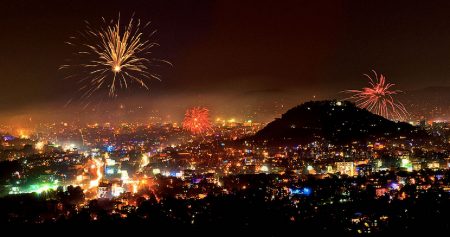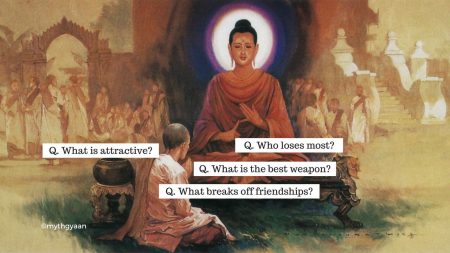Table of Contents
The quest for the mysterious deer:
At the end of 12 years of exile in the forest, Yudhishthira, his brothers, and their wife Draupadi had to live in Agyat Vas (living Incognito). On their long journey, they met a Brahmin. He complained that a deer has taken on its antlers accidentally, a pair of wooden blocks which are used to generate fire by friction. Because of this, he was unable to perform Vedic rituals. He requested Pandavas to find his wooden blocks. Pandavas readily agreed. Pandavas follow the hoof-marks of the deer.
In their quest of finding the deer, Yudhishthira becomes exhausted and thirsty. Nakula, his brother ventured into the forest for water and found a beautiful lake. Lake was devoid of any living creature except a crane (Baka).
Death of Pandavas
As he makes attempt to collect some water from the lake, crane spoke to him. Crane said,”If you collect water from the lake without answering my questions, the water of this lake will become poison for you”. Nakula in arrogance ignored the crane and collect the water. Upon drinking the water, Nakula instantly died of poisoning.

His twin brother, Sahadeva came in search of him. He saw his brother dead and thought of first drinking the water and then search for the person who kills his brother. He was too warned by the crane. Just like Nakula, he too in arrogance ignored the crane, drank the water from the lake & died of poison.
In the same manner, Arjuna and Bhima met the same fate. Then Yudhishthira came in search of his brothers as none of his brothers returned. When he reaches near the lake, he sees all were dead. He said, “There are no strokes of weapons upon these, nor is any one’s foot-print here. The being must be mighty I think, by whom my brothers have been slain (killed)”. Yudhishthira decided to drink some water before searching for the killer of his brothers, as was very thirsty.
Again the crane warned Yudhishthira that if he drinks the water without answering his questions, he will also die, just like his brothers. Yudhishthira was the wise and intelligent one among his brothers. He thought that the crane must know something about the death of his brothers.
Crane reveals itself to Yudhishthira

Yudhishthira agreed to answer his questions. Before asking the questions, the crane reveals itself to be Yaksha. He asked many questions with philosophical and metaphysical consequences. This dialogue between the Yaksha and Yudhishthira is expressed in the Madhya Parva of the Mahabharata. It is also known as the Dharma-Baka Upakhyan (Legend of the Virtuous Crane).
Riddle contest between Yaksha and Yudhishthira
Question 1: What it is that makes the sun rise? Who keeps him company (stay with him)? Who causes the sun to set? And where is the sun established?
Yudhishthira answered, “Brahma makes the sun rise. Gods keep him company by traveling around the sun. Dharma causes the sun to set. And the sun is established in truth only”.
Question 2: By doing what one become learned? By doing what he attain what is very great? How can one have a second? And how can one acquire intelligence?
He answered, “It is by the (study of the) Srutis that a person becomes learned. It is by ascetic austerities that one acquires what is very great. It is by intelligence that a person acquires a second. And it is by serving the old that one become wise”.
Question 3: What constitutes the divinity of the Brahmanas? What even is their practice that is like that of the pious? What also is the human attribute of the Brahmanas? And what practice of theirs is like that of the impious?
He answered, “The study of the Vedas constitutes their divinity. Their asceticism constitutes behavior that is like that of the pious. Their liability to death is their human attribute. And slander (defamation) is their impiety”.
Question 4: What instills the divinity in the Kshatriyas? What even is their practice that is like that of the pious? What is their human attribute? And what practice of theirs is like that of the impious?
He answered, “The art of archery instills divinity in Kshatriyas. The celebration of sacrifices is that act which is like that of the pious. Liability to fear is their human attribute. And the refusal of protection of people is that act of theirs which is like that of the impious”.
Question 5: What is that which constitutes the Sama of the sacrifice? What the Yajus (prose mantra) of the sacrifice? What is that which is the refuge of a sacrifice? And what is that which sacrifice cannot do without?
Yudhishthira answered, “Life is the Sama of the sacrifice. The mind is the Yajus of the sacrifice. The Rik (mantras) is that which is the refuge of the sacrifice. And it is Rik (mantras) alone which sacrifice cannot do without”.
Question 6: What is of the foremost (most important) value to those that cultivate? What is of the foremost value to those that sow? What is of the foremost value to those that wish for prosperity in this world? And what is of the foremost value to those that bring forth?
He answered, “Rain is of the foremost value to those that cultivate. Seed is most valuable for those who sow. And offspring is of the foremost value to those that bring forth (bring into being)”.
(Also Read: Why Pandavas went to Naraka & Kauravas to Swarga in Mahabharata?)
Question 7: What is heavier than the earth itself? What is higher than the heavens? What is fleeter than the wind? And what is more numerous than grass?
He answered, “The mother is heavier than the earth itself and the father is higher than the heavens. The mind is fleeter (rapid) than the wind. And thoughts are more numerous than grass”.
Question 8: What is that which does not close its eyes while asleep? What is that which does not move after birth? What is that which is without a heart? And what is that which swells with its own impetus?
Yudhishthira answered, “A fish does not close its eyes while asleep. An egg does not move after birth. A stone is without a heart. And a river swells (grows) with its own impetus (motivation)”.
Question 9: Who is the friend of the exile? Who is the friend of the householder? Who is the friend of one who is ill and one who is dying?
He answered, “The friend of the exile in a distant land is his companion. The friend of the householder is the wife. The friend of one who is ill is the physician and the friend of one who is dying is charity”.
Question 10: Who is the guest of all creatures? What is the eternal duty? What is Amrita (nectar of immortality)? And what is this entire Universe consist of?
He answered, “Agni (god of fire in Hindu mythology) is the guest of all creatures. The milk of kine (cows collectively called kine) is Amrita. Homa (ritual wherein a religious offering is made into the fire). And the Universe consists of air alone”.
Question 11: What is that which sojourn (stay somewhere temporarily) alone? What is that which is re-born after its birth? What is the remedy against the cold? And what is the largest field?
Yudhishthira answered, “The sun sojourn alone. Moon is re-born after its birth. Fire is the remedy against the cold. And Earth is the largest field”.
Question 12: What is the highest refuge (protection) of virtue, fame, heaven and of happiness?
He answered, “The highest refuge of virtue is Liberality (generosity): of fame is Gift: of heaven is the Truth: and of happiness is Good Behavior”.
Question 13: What is the soul of man? Who is that friend bestowed (to give something as an honor or gift) on man by the gods? What is man’s chief support? And what is his chief refuge?
He answered, “The son is a man’s soul and wife is the friend bestowed on him by the gods. The clouds are his chief support and the gift is his chief refuge”.
Question 14: What is the best of all laudable (deserving praise) things? What is the most valuable of all his possessions? What is the best of all gains? And what is the best of all kinds of happiness?
He answered, “Skill is the best of all laudable things. Knowledge is the most valuable of all his possessions. Health is the best of all gains and Contentment is the best of all kinds of happiness”.
Question 15: What is the highest duty in the world? What is that virtue which always bears fruits? What is that which if controlled, leads not to regret? And with whom an alliance can never break?
Yudhishthira answered, “Refrain (stop oneself) from injury is the highest duty in the world. The rites ordained in the Three Vedas always bear fruit. Mind if controlled lead not to regret and alliance the with the good can never break.”
Question 16: What is that which, when renounced, makes one agreeable? What is that which if renounced makes oneself happy and wealthy? What is that which if renounced leads to no regret?
Yudhishthira answered, “Pride if renounced (give up) makes one agreeable. By giving up desires one becomes wealthy and by giving up avarice (greediness) one becomes happy. And renouncing wrath (extreme anger) leads to no regret”.
Question 17: For what do one giveaway to Brahmanas, to mimes and dancers, to servants and the king?
He answered, “It is for religious merit, do one giveaway to Brahmanas. It is for fame, that one giveaway to mimes (comedian) and dancers. For supporting and helping that one giveaway to servants and for obtaining relief from fear that one giveaway to the kings”.
Question 18: With what, the world is enveloped? What is that owing to which a thing cannot discover itself? For what are friends forsaken (ignored)? And for what does one fail to go to heaven?
He answered, “The world is enveloped with darkness and it does not permit a thing to discover itself. Friends are ignored or forsaken for avarice or greediness. And because of the connection or attachment to the world, one fails to go to heaven”.
Question 19: For what may one be considered as dead? For what may a kingdom be considered as dead? For what may a Sraddha (any act that is performed with all sincerity and faith) be considered as dead? And for what, a sacrifice?
He answered, “For want of wealth, a man is considered as dead. For want of a king, a kingdom may be regarded as dead. A Sraddha that is performed with the aid of a priest that has no learning may be regarded as dead. And a sacrifice in which there are no gifts for Brahmanas is considered dead”.
Question 20: What enemy is invincible? What constitutes an incurable disease? What sort of man is honest and what sort is dishonest?
Yudhishthira answered, “Anger is the invincible enemy. Covetousness (greediness) constitutes an incurable disease. A man who desires the well-being of all creatures is honest and noble, and the one without mercy is dishonest”.
Question 21: What is that thing which is like a Mantra in the performance of rites (Yajna)? Who is the performer of rites and ceremonies during Yajna? Who accepts the offerings and oblations of a Yajna? What is that which even a Yajna can not transgress (violate)?
He answered, “Breath is like the mantra in the performance of the rites. The mind is the performer of the rites and ceremonies during Yajna. The Shlokas of the Vedas accept the offerings of the rites. The Yajna cannot violate or surpass the Mantras“.
Question 22: Who is truly happy? What is the greatest wonder? What is the path? And what is the news?
He answered, “A person without any debts is truly happy. The greatest wonder is that irrespective of a countless number of people die, day after day and still, the living wishes to live forever. The heart alone is the path along which greats have tread. This world full of ignorance is like a pan. The sun is fire, the days and nights are fuel. The months and the seasons constitute the wooden ladle. Time is the cook that is cooking all creatures in that pan (with such aids). This is the news”.
Question 23: What constitutes the way? What has been spoken of as water? What, as food? And what, as poison? Also, what is the proper time of a Sraddha?
He answered, “That they are good constitutes the way. Space has been spoken of as water: the cow as food: a request as poison. And a Brahmana is regarded as the proper time of a Sraddha”.
Question 24: What is said to be the sign of asceticism? And what is true restraint? What constitutes forgiveness and what is shame?
Yudhishthira answered, “Staying in one’s own religion is a sign of asceticism. Restraint of mind is the true restraint. Forgiveness consists in enduring enmity and shame, in withdrawing from all unworthy acts”.
Question 25: What said to be knowledge? What, tranquillity (calmness)? What constitutes mercy? And what has been called simplicity?
He answered, “True knowledge is that of Divinity. True tranquility is that of heart. Mercy consists in wishing happiness to all and simplicity consists in equanimity (calmness) of heart”.
Question 26: ‘What is ignorance and what is pride? What also is to be understood by idleness? And what has been spoken of as grief?
He answered, “True ignorance is not knowing one’s duties. Pride is a consciousness of one’s being himself an actor or sufferer in life. Idleness consists in not discharging one’s duties, and ignorance in grief”.
Question 27: What has steadiness been said by the Rishis to be? What are patience and real ablution (bath)? And also what is charity?
He answered, “Steadiness consists of staying in one’s own religion and true patience consists in the subjugation (control) of the senses. Real ablution consists in washing the mind clean of all impurities, and charity consists in protecting all creatures”.
Question 28: What man should be regarded as learned, and who should be called an atheist, and who is to be called ignorant? What is called desire and what are the sources of desire? And what is envy?
Yudhishthira answered, “The one who knows his duties should be regarded as learned. The one who is ignorant is atheist and ignorant is the one who is an atheist. Desire is due to objects of possession and envy is nothing but the grief of heart”.
Question 29: What is the pride and what is hypocrisy? What is the grace of the gods and what is wickedness?
He answered, “Stolid (showing little emotion) ignorance is pride. The setting up of a religious standard is hypocrisy. The grace of the gods is the fruit of our gifts, and wickedness consists in speaking ill of others”.
Question 30: Virtue, profit, and desire are opposed to one another. How could things thus antagonistic (opposite) to one another exist together?
He answered, “When a wife and virtue agree with each other, then all the three mentioned may exist together.”.
Question 31: Who is he that is condemned to everlasting hell?
He answered, “He who promises a poor Brahmana to make him a gift and then tells him that he has nothing to give, goes to everlasting hell. Also, the one who imputes (represent as being done) falsehood to the Vedas, the scriptures, the Brahmanas, the gods, and the ceremonies in honor of the Pitris, goes to everlasting hell. Also, the one who though in possession of wealth, never gives away nor enjoy himself from avarice (greediness), saying, he has nothing, goes to everlasting hell”.
Question 32: By what, birth, behavior, study, or learning does a person become a Brahmana?
Yudhishthira answered, “It is neither birth, nor study, nor learning, that is the cause of Brahmanahood. It is behavior that constitutes it. One’s behavior should always be well-guarded, especially by a Brahmana. He who maintains his conduct unimpaired is never impaired himself. Professors and pupils, all who study the scriptures, if addicted to wicked habits, are to be regarded as illiterate wretches. He is the one who performs his religious duties. Even the one who has studied the four Vedas is to be regarded as a wicked wretch if his conduct is not correct. He only who performs the Agnihotra and has his senses under control is called a Brahmana”.
Question 33: What does one gain that speaks agreeable words? What does he gain that always acts with judgment? What does he gain that has many friends? And what he, that is devoted to virtue?
He answered, “The one who speaks agreeable words becomes agreeable to all. The one who acts with judgment obtains whatever he seeks. He who has many friends lives happily. And he that is devoted to virtue obtains a happy state (in the next world)”.
Question 34: What man truly possesses every kind of wealth?
He answered, “The report of one’s good action reaches heaven and spreads over the earth. As long as that report lasts, so long is a person to whom the agreeable and the disagreeable, weal and woe, the past and the future, are the same, is said to possess every kind of wealth”.
Yaksha reveals himself to be Yudhishthira’s:
Yaksha was extremely happy with the answers of Yudhishthira and reveals himself to be Yama-Dharma, the god of death and was none other than the father of Yudhishthira. He asks Yudhishthira, “I can give life to one of your four brothers. Which one do you wish to get up with life”.
Yudhishthira replied, “Let Nakula get up with life”. Yama was surprised that why Yudhishthira does not ask for Arjuna’s (the might of whose arm is worshipped by all the sons of Pandu) or Bhima’s (whose strength is equal to that of ten thousand elephants) life as they can help him to win the war. And why he wishes his step-brother to get up with life.
Yudhishthira replied, “My father has two wives, Kunti and Madri. There is no difference between them in my eyes. I desire to act equally towards my mothers. If the son of Kunti is alive, then the son of Madri should also be alive. This is the virtue and I never forsake virtue because if virtue is sacrificed then the one who sacrificed it, is himself lost. Therefore let Nakula live”.
After hearing this Yama was delighted and blessed him saying since he had adhered to Dharma (righteousness) in this dilemma also and gives life back to all his brothers. He also blessed him that Dharma would protect them and no-one would recognize them during the Agyat Vasa.


